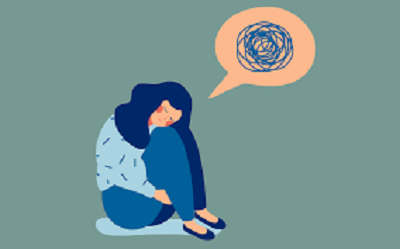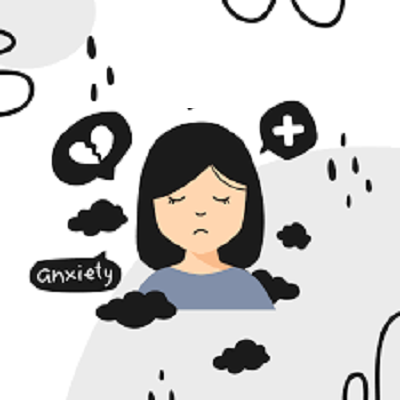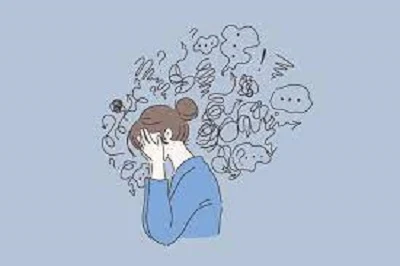Anxiety is a widely widespread human revel in, a natural
response to strain or hazard. while it may be a helpful mechanism for keeping
us alert and secure,
it may also turn out to be overwhelming and debilitating
whilst it lingers or will become continual. understanding the technology of
tension,
what occurs in your intelligence and frame whilst you’re tense, can
shed mild on this complex phenomenon. In this blog, we’ll take a closer look at
the complex workings of hysteria from a systematic attitude. read more
The Genius’s position in anxiety
The Genius performs a central function in the enjoyment of
anxiety. numerous key regions and neurotransmitters are concerned:Amygdala:
regularly known as the Genius’s “alarm device,” the amygdala is
chargeable for detecting potential threats. whilst it perceives a threat, it
sends out indicators that cause the frame’s strain reaction.
Hypothalamus: The hypothalamus, placed deep in the brain,
receives alerts from the amygdala and initiates the release of stress hormones,
such as cortisol and adrenaline.
Prefrontal Cortex: This vicinity of the
intelligence is liable for selection-making and rational concepts. throughout
anxiety, it can be impaired, making it challenging to assume in reality and
logically.
The fight or Flight response
while anxiety kicks in, your body goes into “fight or
flight” mode. This historic survival mechanism prepares you to respond to
a threat.
Right here’s what happens: improved coronary heart fee: Your coronary
heart fee hurries up to pump more oxygen-wealthy blood into your muscle groups,
getting ready for motion.
rapid breathing: Your respiration quickens to oxygenate your
blood and provide power for your body. Muscle tension: muscle groups traumatic
up,
geared up for motion or to defend in opposition to a threat. Dilated
pupils: Your pupils amplify to improve your vision and peripheral attention.
Heightened Senses: Your senses end up sharper, enhancing your ability to come
across threats.
Neurotransmitters and tension
Neurotransmitters are chemical messengers that transmit
signals between nerve cells. In tension, two neurotransmitters play a huge
role: Gamma-Aminobutyric Acid (GABA): GABA is an inhibitory neurotransmitter
that allows altered brain activity. In tension problems, GABA hobby may be
reduced, mainly due to expanded excitability in the intelligence.
Serotonin: Serotonin is called the
“experience-precise” neurotransmitter. Low serotonin stages have been
linked to temper problems, which include tension and depression.
continual strain and tension
when anxiety becomes chronic, the constant activation of the
strain reaction will have unfavorable effects on your body and mind.
it could
result in several bodily and intellectual health troubles, which include:
Cardiovascular troubles: continual pressure can contribute to excessive blood
pressure, coronary heart disease, and other cardiovascular issues.
Weakened Immune gadget: prolonged stress weakens the immune
system, making you greater vulnerable to ailments. intellectual health issues:
anxiety disorders, melancholy, and different mental health conditions
frequently coexist with chronic stress and anxiety.
anxiety is a complex interplay of neurological,
physiological, and mental factors. perception of the science in the back of
anxiety can help demystify this not-unusual human experience. it’s critical to
keep in mind that anxiety, whilst herbal, needs to be controlled and treated
when it interferes with day-by-day existence.
in case you or a person you understand is suffering from
anxiety, searching for expert help from a therapist or counselor is a
quintessential step toward handling anxiety correctly. By way of grasping the
science of anxiety, we will increase better strategies for coping and lead more
healthy, extra pleasurable lives.
The talent responds to anxiety via a complicated interplay
of neural methods regarding diverse regions and neurotransmitter systems.
tension is a normal response to stress or perceived threats, but whilst it will
become continual or excessive, it can cause tension issues. here is a
simplified overview of how the intelligence responds to tension:
Amygdala Activation: The amygdala, a small almond-shaped
shape deep in intelligence, performs a crucial role in processing emotional
responses, together with fear and anxiety. when you understand a capability
danger, the amygdala fast assesses the situation and initiates a “fight or
flight” response.
Hypothalamus Activation: The amygdala communicates with the
hypothalamus, which is liable for regulating the body’s stress response. The
hypothalamus activates the sympathetic nervous machine, leading to the
discharge of stress hormones, ordinarily adrenaline and cortisol.
launch of pressure Hormones: Adrenaline prepares the body
for fast movement with the aid of increasing heart price, dilating airways, and
redirecting blood flow to the muscle mass. Cortisol, released gradually,
enables one to maintain those physiological changes over an extra prolonged
period.
Prefrontal Cortex Involvement: The prefrontal cortex, in
particular, the dorsolateral prefrontal cortex (DLPFC) and the anterior
cingulate cortex (ACC), performs a role in regulating emotions and
choice-making. In cases of tension, this place might also turn out to be less
active or less effective in inhibiting fear responses generated using the
amygdala.
Hippocampus position: The hippocampus is involved in
processing and contextualizing recollections. It facilitates deciding whether
or not a scenario is simply threatening based totally on beyond reviews. In
anxiety disorders, changes in hippocampal characteristics may result in
exaggerated or beside-the-point worry responses.
Neurotransmitter Imbalance: Neurotransmitters like
serotonin, GABA (gamma-aminobutyric acid), and glutamate play fundamental roles
in temper regulation and anxiety. Imbalances in these neurotransmitters can
contribute to the development of tension disorders.
talent Circuits: tension entails a network of brain regions,
frequently known as the “tension circuit.” This network includes the
amygdala, prefrontal cortex, hippocampus, and other areas. Dysregulation in
those circuits can contribute to the endurance of tension signs.
Neuroplasticity: persistent tension can cause adjustments in
the brain’s structure and characteristics over the years. these modifications can
also further exacerbate tension signs and make it extra difficult to manipulate
the situation.
it’s critical to word that the talent’s response to anxiety
is notably individual, and factors including genetics, existence reports, and
environmental
effects can all contribute to the development and manifestation
of hysteria problems. remedy for tension often includes an aggregate of
psychotherapy, remedy (if essential), and lifestyle modifications to cope with
those neurological and mental elements of hysteria.
managing anxiety effectively regularly includes an aggregate
of proof-based techniques and lifestyle changes. here are some evidence-based
pointers for handling tension: Cognitive-Behavioral therapy (CBT):
CBT is a
well-mounted therapeutic technique for treating tension issues. It facilitates
individuals to discover and trade terrible thought patterns and behaviors
contributing to their tension. looking for the steerage of a skilled therapist
may be notably effective.
Mindfulness and Meditation: Mindfulness-based interventions,
along with mindfulness meditation and progressive muscle rest, have been shown
to lessen tension signs and symptoms. those practices assist people turn out to
be extra aware of their thoughts and feelings and broaden greater control over
their responses to stressors.
normal workout: physical interest has severe mental health
blessings, such as lowering anxiety. exercising releases endorphins, which can
be herbal mood lifters. the purpose for at least 150 mins of moderate-depth exercise
in step with the week.
wholesome food regimen: Nutrient-rich foods, along with
culmination, greens, complete grains, and lean proteins, can aid average
well-being and can help modify mood. avoid immoderate caffeine and sugar, as
they could exacerbate tension.
enough Sleep: terrible sleep can cause worse anxiety signs
and symptoms. establish a constant sleep timetable, create a calming bedtime,
and intention for 7-9 hours of high-quality sleep according to night. strain
control:
mastering pressure management techniques like deep breathing
exercises, progressive muscle relaxation, or biofeedback can help lessen
tension. those methods can set off the body’s rest reaction.
Social assist: strong social connections can provide
emotional assistance and decrease emotions of isolation. speak to dependent on
buddies or circle of relatives members about your tension, and think about
becoming a member of a support group if available.
restrict Alcohol and Substance Use: Alcohol and pills can
exacerbate anxiety signs. restriction or avoid their use, mainly if you have an
anxiety sickness.
restrict information and Social Media: steady publicity of
distressing news or social media can contribute to tension. limit your
publicity and consider placing precise instances to test the information or
social media. Time management: effective time management can lessen feelings of
overwhelm and anxiety. Use strategies like putting priorities, breaking duties
into smaller steps, and the use of calendars or to-do lists.
are seeking professional help: if your anxiety extensively
interferes with your everyday lifestyle, think about seeking expert assistance.
intellectual fitness specialists can provide remedies and, if necessary,
medicinal drugs to control signs.
Self-Care: Make self-care a priority. engage in sports you
enjoy, exercise hobbies, and take time for relaxation and entertainment.
mind-body Practices: Yoga and tai chi combine physical activity with
mindfulness strategies and were shown to lessen anxiety.
modern publicity: For unique phobias or tension problems,
reflect on the consideration of systematic desensitization or publicity therapy
underneath the steerage of a skilled therapist. these processes help
individuals confront and steadily overcome their fears.
keep in mind that what works first-class for coping with
tension can range from individual to man or woman. it’s integral to visit a
healthcare issuer or mental health expert to determine the most appropriate
strategies and interventions for your particular wishes.
A combination of these
evidence-primarily based approaches can regularly offer the most complete and
powerful tension control. read more



